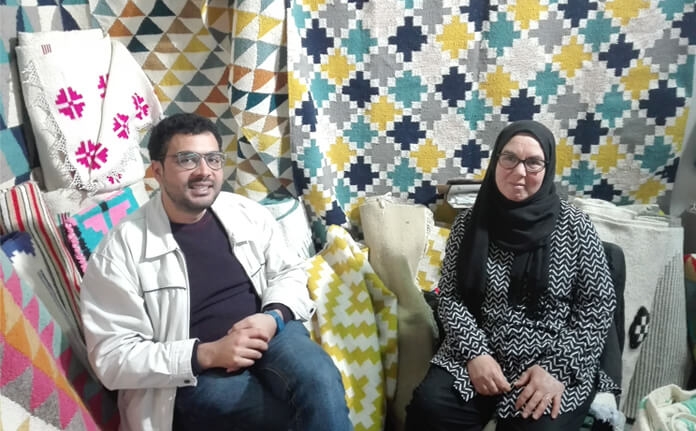
During the Kram Exhibition Fair, we met Madam Naima, an artisan from el Kef region,( Northwest of Tunisia) who is collaborating with Qartaj and we had an interview with her:

_Interviewer: Can you present yourself ?
_Madam Naima: My name is Naima Cherni and I am an artisan from El Kef, I am actually from Tajerouine and I am working with 25 women in Kilim and carpet weaving. I am into this field for more than 20 years.
_Interviewer: What are the main features of El Kef region and what makes it different from other regions of the country at the level of carpet weaving?
_ Naima: Well, El kef is very different from other regions of Tunisia in the way we make Kilims and carpets, so we are providing double sided pieces unlike other regions of the south and this makes us distinguishable. We also have our own designs, we are famous by “Khamret el Kef” (a pattern used while weaving).
_Interviewer: Do you just sell your own models or you can also custom design other models depending on the demands of your clients ?
_Naima: It’s very often, that most of my clients provide me with their own designs and so ,in this case, I custom design the models they want and regarding to my own collection of products, I usually sell it during the days of the fair.
_Interviewer: What are the main characteristics of your collection and what are your sources of inspiration?
_Naima: In my collection, I try to find a symmetry between form, shape and colors. I also try to make my work a combination of the traditional designs with the new trendy tastes. I am not looking for perfection but I really want an up to date work so it reaches different categories of people.
_Interviewer: One word about your job? How did you learn it ? Do you like it?
_Naima: My mother taught me the techniques of weavings when I was a child and then I started to develop my skills. After getting married and having children, I stopped making Kilims because I wanted to spend much time with my children. Later on, when they grew up, I had enough free time so I got back to my job. I started from scratch and things grew bit by bit. I mean all is about passion, I really love my job and I can't imagine myself out of this field unless I pass away.
_Interviewer: Can you tell us about the different techniques of weaving?
_Naima: The process of weaving is mainly about measuring, we make kilims with Knots, for instance for one meter we measure the Knots and the process continues like that, one kilim differs from the other one when it comes to measuring the knots within every piece.
_Interviewer: What about the colors of the wool? Do you dye it? How do you make them?
_Naima: I sometimes buy a dyed type of wool and ,other times, when it comes to colors like brown and Beige, I dye it naturally using “tea” and the Tunisian “Hennah”
_Interviewer: How much time it takes you to finish one Kilim/Carpet?
_Naima: As I said earlier, I am working with 25 women so the work is divided, each of 2 work on one Kilim and it takes them about 10 or 15 days to finish one piece depending on the design they are working on.
_Interviewer: How long does it take for artisans to really build some confidence in their crafts?
_Naima: As the well saying tells it “Life is short, the crafts so long to learn”, it took me about 5 to 6 years of work to become really confident about my work. Handmade work is really hard as opposed to machines which are pretty quick to get the hang of but you don’t want to become overconfident.
_Interviewer: Is there a good demand on your products!
_Naima: Yeah! people are buying! Everything is good! There is also a quite big demand from the foreign market. Qartaj ,in fact, is enabling us to sell our products abroad and we are very thankful and lucky to deal with such an export company which helps us to earn a living out of this work.
_Interviewer: What advice can you give to young designers or to young Tunisians in general?
_Naima: Young generations need to develop their skills in the artisanal field because this is their only way to preserve their cultural heritage. Otherwise, my unique advice to young designers is that they should open up to other cultures and other countries in order to enlarge their knowledge about foreign designs and this way they get a better idea and they ,at a final point, position themselves and get to walk on the right path.
_ Interviewer: Any quotation that you like or you really believe in ?
_Naima: I truly believe in this old Tunisian saying “All inherited tangible things can disappear and just one thing remains forever; our inherited savoir-faire is really what matters most and can never be buried.”
_Interviewer: I think we just got everything about you, thank you for your time.
_ Naima: Thank you.
Tunisia, 28th of March 2019
Written by: Maroua Mejri
